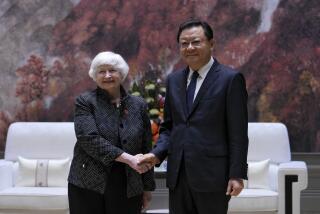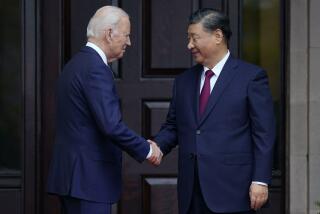Chinese premier slams U.S. ‘protectionism,’ says yuan is not too low
Reporting from Beijing — In an annual news conference Sunday that took direct aim at the United States, Chinese Premier Wen Jiabao defended his country’s currency policy and said it was up to Washington to mend Sino-American relations.
Rejecting charges that China kept the yuan artificially low to boost its exports, Wen said the Chinese currency was not undervalued and that the government’s policy of controlling the exchange rate had boosted imports and helped spur economic recovery across the globe.
President Obama on Thursday called on Beijing to move to “a more market-oriented exchange rate.” But Wen gave no hint that the yuan would appreciate. He instead promised to keep the currency “stable” and at a “balanced level” while accusing the U.S. of protectionist trade policy.
Liu Baocheng, a professor at the University of International Business and Economics in Beijing, said Wen’s comments reflected the concerns and interests of local governments and manufacturers who are lobbying to bolster employment and profits.
“China is under domestic pressure to maintain export momentum and also stabilize the currency,” Liu said. “There’s a general outcry for the government to be stronger on international pressure, especially under the financial crisis.”
Wen’s remarks on currency in the face of growing international demands set the tone for the two-hour, 15-minute session with reporters in which the Chinese premier admonished the U.S. for hosting the Dalai Lama and selling arms to Taiwan.
Wen said Washington had violated China’s sovereignty and territorial integrity, and he challenged American leaders to improve ties between the two countries.
“These have seriously disrupted Sino-U.S. relations,” Wen said. “The responsibility does not lie with the Chinese side but with the United States.”
The Chinese leader expressed concern for China’s vast holdings of U.S. assets because of the dollar’s depreciation.
“Some countries’ moves to shore up exports are understandable,” he said. “But what I cannot understand is they devaluate their own currencies while on the contrary push for the appreciation of others’ currencies. I think it is protectionism.”
The conference, broadcast live on state television from the Great Hall of the People, allowed the premier to articulate how China sees its role as a growing player on the world stage.
Wen rebuffed international criticism that China had become arrogant and was engaging in triumphalism -- charges that were largely flung after the Copenhagen climate-change talks ended without a binding agreement. Wen painted the world’s most populous nation as a country marching toward development against major odds.
Citing the yawning income gap between urban and rural residents and China’s unbalanced economy, Wen said the government had too many domestic issues to address to focus on influencing affairs overseas. China, he said, would always be a passive nation.
“China will never seek hegemony,” Wen said.
The premier was asked about the souring business environment for foreign companies in light of Google’s high-profile threat to leave China and the arrest of employees of the Australian mining giant Rio Tinto last year. He said that China would create a “fair playing ground.”
Wen said China wanted more foreign companies to build research-and-development centers and introduce advanced technology. He also said he would begin meeting with the foreign business community.
The press conference closed out China’s 10-day annual legislative session and represented a rare opportunity for foreign and domestic journalists to speak to the premier.
More to Read
Sign up for Essential California
The most important California stories and recommendations in your inbox every morning.
You may occasionally receive promotional content from the Los Angeles Times.











